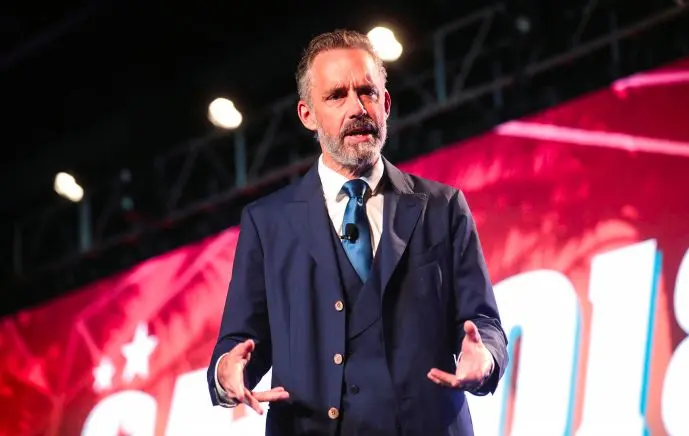Sept 2023: NCI
https://nationalcitizensinquiry.ca/ Have you seen it? It’s a bit of a bombshell. Hallelujah! But it won’t achieve its potential without us pushing it out, hard.
In addition to listening to the PRESS CONFERENCE (at the bottom of https://nationalcitizensinquiry.ca/commissioners-report/), I listened to the testimony of Shawn Buckley. It’s a fuse in the powder keg – – covid vaccines “Not Safe and Not Effective”.
– – – – – – – – – – –
Nov 2023. More, NCI:
Rodney Palmer spoke to the crowd on Nov 18th, Calgary, Rebel News event. Impressive presentation. I wanted to hear more from this retired journalist.
As serendipity would have it, Mr. Palmer stayed at the same hotel as myself. I ran into him as he was leaving to catch a flight.
Rodney’s “life changed” after his testimony to the NCI was uploaded and went viral. His expertise is in great demand as a speaker and consultant.
Rodney Palmer is an award-winning journalist who has worked for 20 years as a foreign correspondent for CTV news and investigative reporter for CBC Radio & Television in Canada and abroad. He was the CTV News Foreign Correspondent and Bureau Chief in India, China, and the Middle East
Rodney’s explosive testimony during the NCI Toronto hearing on day 1 provided evidence as to how CBC in particular is not conducting newsgathering, they are focusing on propaganda.
I listened to his NCI testimony. Palmer is a professional. His experience is valuable. Thanks to someone on the internet: I would say the following paragraph is accurate, adding that Rodney Palmer “tells” of instances using pictures captured at the time. I recognize some of the pictures from live coverage of the Freedom Convoy.
Mr. Rodney Palmer reports of how he was in Beijing when SARS broke out and how COVID was dealt with very differently. In chronological order, the systematic propaganda inflicted on Canadians by the CBC, regarding the safety of vaccines. He tells of many instances of the CBC journalists and newscasters lying to the public on their various broadcasts of news and other shows.
From the brief one-on-one encounter I (Sandra) had with Rodney Palmer, I would say that his experience as a foreign correspondent helped equip him to understand the current dangerous state of governance in Canada. Rodney and others like him who understand have jumped in and are tireless. They are urgent soldiers.
They need us to play our role: TALK! tell others. We are not going to get through this any other way.
I spoke with a 40-year-old Somalian man who was a child during the Civil War in Somalia. He knew exactly the problem with staying in our silos: Too many second and third generation Canadians are comfortable. They have never experienced or don’t know a family history of living under tyranny, let alone in poverty. Many are poorly educated about Governance. The Freedom Convoy brought people from all ethnicities together in unified purpose. People who know and understand the value and fragility of freedom. To me, Freedom is a sacred gift to be studied, cherished and protected by the community.
From a friend regarding Rodney Palmer:
This is extraordinary information everyone needs to see!
National Citizens Inquiry [into Canada’s response into Covid-19]
https://nationalcitizensinquiry.ca/ [on Rumble, Youtube, Twitter, Facebook, Tiktok]
“You have to be able to face the truth, and that’s the first thing we need to do is we need to tell the truth. People who think–who are suspicious or cynical about what’s happening, they haven’t watched the testimonies.”
Rodney Palmer, Former News Journalist: “The CBC is a public news entity. We pay for it. They broadcast on the public airwaves, and we trust them to tell the truth, because they’ve done it for 50 or 60 years…The government rollout of the vaccines was impossible without the collaboration of the CBC…And in a moment of exception, you could say, “Okay, we’re going to let the CBC be the public health system right now, but the emergency’s over, and the exception still exists…Bad journalism is incompetence, but propaganda is a betrayal, and that’s what CBC’s done. It’s betrayed us all.”
= = = = = = = = =
(Sandra): With many thanks to my friend Lizzy. Rodney Palmer’s presentation to the NCI:
The Corruption of Canada’s CBC: Covid-19 Reporting under the Trudeau Government
Trust in the CBC is on the ropes – an elected oversight board is needed

1. Introduction and Background
2. Testimony from Former CBC Journalists:
a. Rodney Palmer: CBC Covid-19 reporting influenced by US disinformation agency, First Draft
b. Rodney Palmer: CBC Covid-19 reporting was guided by the Trusted News Initiative
c. Rodney Palmer: CBC reporting on “Anti-vaxxers”
d. Rodney Palmer: CBC Covid reporting on Ivermectin/Hydroxychloroquine
e. Former CBC Fifth Estate anchor Trish Wood Podcast with Rodney Palmer
f. Two other former CBC journalists resign in protest against the superficial controlled agenda of their once beloved institution
3. Crisis: Too Many Canadians Want the CBC De-funded
4. How the CBC is Administered and Funded
5. Fixing the CBC
Introduction and Background
(This would be Lizzy speaking. I don’t know how much of the following is her research. She is a dedicated researcher and good at it.): In early April, 2023, I witnessed testimony from Rodney Palmer,[1] a former CBC journalist to the National Citizens Inquiry on Canada’s Covid-19 response.[2]
This in-depth testimony shocked me to the core. I marvelled, realizing that this disturbing evidence will rewrite the history of Canada’s Covid-19 response for years to come. Something serious had changed at the CBC.
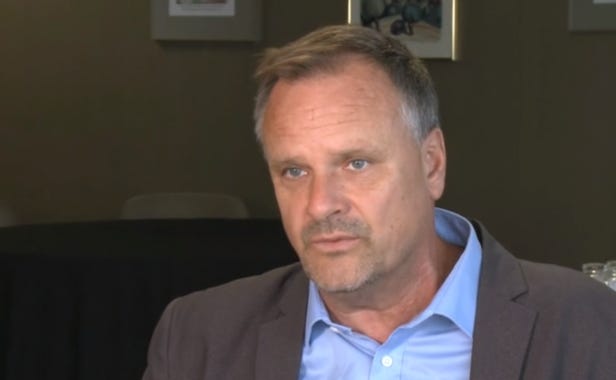
To start with some background, the Canadian Broadcasting Corporation, founded in 1936, is a crown corporation that currently reports to the Minister of Canadian Heritage in Canada’s Liberal Government. Its CEO, Canadian-born Catherine Tait, who is married to an American living in NYC, [3] and who illegally contributed[4] to Hilary Clinton’s 2016 election campaign,[5] was appointed on April, 3, 2018 to lead the CBC into the digital age.[6] [7]
On September 9, 2019, the CBC under Ms. Tait joined the Trusted News Charter.
“The Trusted News Charter is a BBC-led initiative to strengthen measures to protect audiences from disinformation. The Charter is the result of the June 2019 Trusted News Summit and includes a commitment to collaborate on source authentication, civic information, media education, and other responses to disinformation. Other partners just announced include Google, Facebook, Microsoft, Twitter, AFP, Reuters, Financial Times, Wall Street Journal, and the European Broadcasting Union.”[8]
Said Tait, “Disinformation is a global challenge. We need global solutions. Joining the Trusted News Charter is an important part of our ongoing work to ensure Canadians have access to trusted sources of news and information.”[9]
The following day, September 10, 2019, with Catherine Tait as its chair, [10] the Global Task Force for Public Media was formed to develop a consensus and “single strong voice” around the issues and challenges facing public media worldwide.[11] But as Palmer points out, his own job with CBC for a decade was:
“to elevate the voices of Canadians on Canadian stories, to unite our vast country, and make us all feel as one…This is a bizarre conglomerate of public broadcasters…who all have national mandates like the CBC to unite their own people.”
He added – significantly – that the public broadcasters cannot be easily bought, because they have no advertisers, “so something else was done here.”
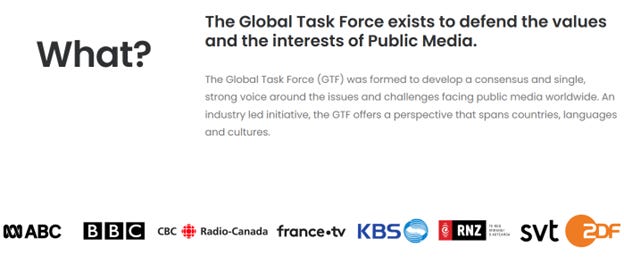
When the World Health Organization declared the Covid-19 pandemic on March, 11, 2020, the Trusted News Charter, now called the Trusted News Initiative, had added the American disinformation agency, First Draft:
“Starting today, partners in the Trusted News Initiative will alert each other to disinformation about coronavirus, including ‘imposter content’ purporting to come from trusted sources. Such content will be reviewed promptly to ensure that disinformation is not republished…The Trusted News Initiative partners are: BBC, CBC/Radio-Canada, Facebook, Google/YouTube, Twitter, Microsoft, AFP, Reuters, Financial Times, The Wall Street Journal, European Broadcasting Union (EBU), The Hindu, First Draft, and Reuters Institute for the Study of Journalism.”[12]
Interestingly, another disinformation organization, Reporters Without Borders (RSF) had unveiled the Journalism Trust Initiative in Paris on April 3, 2018, the same day that Catherine Tait was appointed CEO of the CBC:
“An innovative media self-regulatory initiative designed to combat disinformation online – called the Journalism Trust Initiative (JTI) – was launched today by Reporters Without Borders (RSF), and its partners Agence France Presse (AFP), the European Broadcasting Union (EBU) and the Global Editors Network (GEN).”[13]
Throughout her tenure, Ms. Tait (who had been living in the United States) has been controversial, if not naïve about her CBC function. Traditionally, Canadian crown corporation CEOs never enter partisan politics, a role that Ms. Tait failed to understand by entering a dispute with the Conservative Party of Canada’s Opposition Leader, Pierre Poilievre in February, 2023.[14]

Testimony From Former CBC Journalists
a) Rodney Palmer: CBC Covid-19 policy influenced by US disinformation agency, First Draft
Rodney Palmer is an award-winning Canadian journalist who worked for 20 years as a foreign correspondent for CTV news, and as a producer and investigative reporter for CBC Radio & Television in Canada and abroad. He was also a general assignment reporter for the Globe and Mail, and a daily news reporter for the Vancouver Sun.
Palmer was also the CTV News Foreign Correspondent and Bureau Chief in India, Israel, and China – and was in China when SARS-Cov-1 broke out in 2002. He was in Beijing when SARS-Cov-2 hit the airwaves in 2020.[15]
Palmer’s testimony (and remarkable slide show) to the April 2023 National Citizens Inquiry[16] begins:
I lived in Beijing and worked for CTV News every day and that was when the SARS epidemic broke out, so I followed it extremely carefully. I went to weekly briefings with the World Health Organization, and with the Chinese Foreign Ministry.
I had experience with epidemics and pandemics when COVID started, and I started noticing that it was extremely different. When they shut down Wuhan I knew that it was very, very different. This was something that had not occurred before.
I started noticing something different was happening at the CBC. The CBC is a public entity. We pay for it. It broadcasts on the public airwaves. And we expect them to tell us the truth because they’ve done that for fifty or sixty years.
I noticed something very different about a couple weeks into the emergency. There was a story on The National by Adrienne Arsenault, one of the greatest broadcasters we have – a national treasure…On April 4, 2020, I saw a piece where she’s looking at her phone and she says, “what do you do if somebody sends you a text, say your father, and he thinks the virus was manufactured by China?”
Then she went to an expert guest who said, “don’t embarrass your father, you’ll just push him away. You’ve got to bring him in, kind of convince him.”
The expert witness was from an organization called First Draft, and she simply says they’re a non-profit that helps people navigate misinformation in the media.
Looking into US-based First Draft, Palmer discovered that CBC’s Marketplace had a First Draft story about anti-vaccination websites and how they make their money – and realized that “this First Draft group is now feeding the CBC their stories.”
(Myself, looking yet further into First Draft, I discovered that in June 2022 it moved its disinformation mission to the Brown University School of Public Health, which operates under the deanship of Dr. Ashish Jha.[17]
Ashish Jha is a notorious pharma-friendly media darling who publicly scorned the 2020 Senate testimony of three prominent physicians reporting the medical literature on early Covid treatments including hydroxychloroquine. Jha’s New York Times op-ed rampage was titled “The Snake-Oil Salesmen of the Senate.”[18] By April, 2023, Jha, on temporary assignment to the White House as its Covid-19 response coordinator, was still inflicting the Covid vaccine boosters upon America’s youth.[19])
Back to Palmer pursuing the CBC’s treatment of any father who might think Covid was a lab leak:
FBI chief, Christopher Wray says the China lab leak was most likely. The quote is, “The FBI has for quite some time now assessed that the origins of the pandemic are most likely a potential lab incident.”
So the CBC had no evidence that it wasn’t. But they wanted you to believe that it wasn’t.
There’s a definition in the Oxford dictionary of “newsgathering,” which is “the process of doing research on news items, especially ones that will be broadcast on television or printed in a newspaper.” Now how much research was done by the CBC to determine ten days after the emergency that it didn’t happen in a lab?
Another definition here is “propaganda,” which is “Persuasive mass communication that filters and frames the issues of the day in a way that strongly favours particular interests, usually those of a government or a corporation. Also, the intentional manipulation of public opinion through lies and half-truths, and the selective retelling of history.” This is what was going on in that piece. That’s why it felt so wrong to me, because there was no news involved. There was only propaganda.
What the Washington Post did with its lab leak story, ten days after the CBC said it wasn’t from the lab, was newsgathering. It was investigative reporting. What the CBC did, when it said don’t trust your family if it thinks it came from a lab, was propaganda.


In other words, trust the hidden agencies guiding our tax-supported CBC – even over your own father.
In another CBC propaganda example cited by Palmer, Marilyn Gladu, a Conservative Member of Parliament, was one of 15-30 MP’s who opposed vaccination as a requirement for representing their constituencies in Parliament. CBC’s Katie Simpson (who Palmer has long admired) “beat the hell out of Gladu” on the air for risking public safety by “giving support to the anti-vaxxers.”
Palmer concludes that in framing her guest on the show – and in fact all unvaccinated Canadians – as “dangers to public safety,” Katie Simpson “had no evidence and still has no evidence that anyone who isn’t vaccinated is more likely to spread COVID than a vaccinated person. This was not newsgathering. She was practising propaganda.”[20]
More anti-vax propaganda is revealed in a Palmer slide – showing CBC’s shallow, disrespectful attitude towards public knowledge and intelligence. CBC suppressed one side of the story, because it wasn’t newsgathering; it was propaganda.
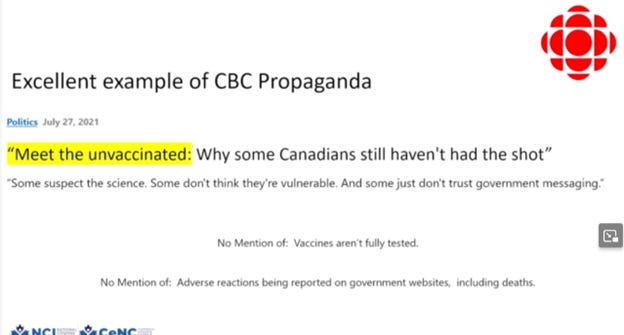
There is only one CBC perspective below on people who are allegedly “hesitant” (too weak and indecisive) to take the untested mRNA vaccines – rather than having come to a firm decision based on their own responsible research:

b) Rodney Palmer: CBC Covid-19 policy was guided by the Trusted News Initiative
Two weeks after WHO announced the Covid-19 pandemic on March 11, 2020, Canada’s CBC reported that the Trusted News Initiative had announced plans “to tackle harmful coronavirus disinformation.”
The TNI then agreed to engage with a new verification technology called Project Origin, led by a coalition of the BBC, CBC/Radio-Canada, Microsoft and The New York Times – with an eerie mandate to identify non-authorized news stories for suppression.
In July, 2020, Eric Horvitz, Chief Scientific Officer for the compliant Microsoft, remarked about authorizing the news: “We’ve forged a close relationship with the BBC and other partners on Project Origin, aimed at methods and standards for end-to-end authentication of news and information.”[21]
More dangerously fascist-leaning, Microsoft announced in February, 2021 that they “and the BBC have teamed up with Adobe, Arm, Intel and Truepic to create the Coalition for Content Provenance and Authenticity (C2PA). The C2PA is a standards-setting body that will develop an end-to-end open standard and technical specifications on content provenance and authentication. The standards will draw from two implementation efforts: Project Origin’s (Origin) efforts on provenance for news publishing and the Content Authenticity Initiative (CAI), which focuses on digital content attribution.”[22]
The CBC throughout was placing a strong emphasis on itself as a trusted news source.

Two years later, reports Mr. Palmer, in January 2023, Catherine Tait was still giving speeches on trusting the CBC, including one at Simon Fraser University.
“The first word out of her mouth was ‘trust’. ‘Trust seems to be in short supply.’ The next phrase is: ‘Disinformation, conspiracy theories, YouTube rabbit hole.’ This is the trusted news initiative mantra…”[23]
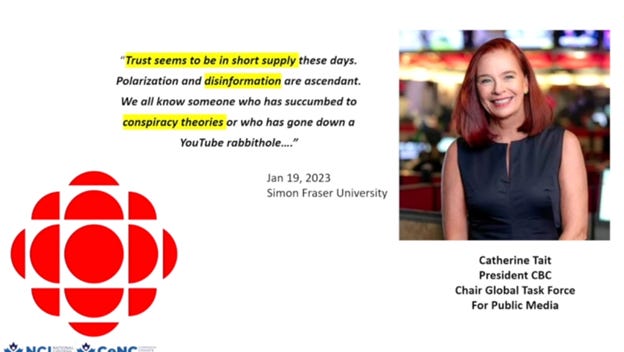
On March 29, 2021, adds Palmer, well-known CBC Toronto Radio host Matt Galloway had interviewed an expert guest from the Center for Countering Digital Hate. The expert declared that “people who are recommending intravenous Vitamin C and hydrogen peroxide nebulization are hate” – and claimed that this was “literally inhaling bleach.”
“He lied that it was inhaling bleach,” said Palmer. Why did Matt Galloway let this man lie on the radio?
The “expert” added, “anti-vaccine misinformation is hate.” He then went on CBC’s “we’ve got your back” Marketplace, who took hate to the next level of censorship:
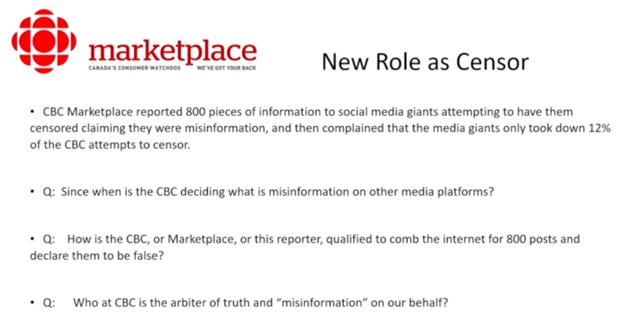
Why are social media comments the business of CBC Marketplace, who like the Prime Minister, “has got our backs”? What is the “something else” that is going on?
c) Rodney Palmer: CBC Policy on “anti-vaxxers”
Palmer reports that the CBC, very successfully, has promoted a new group of Canadians and fomented hate against them. But the CBC does not tell us who these “anti-vaxxers” are, or what they believe. “Do they need to have mental correction? Psychological retraining?”
d) Rodney Palmer: CBC Covid-19 Policy on Ivermectin and Hydroxychloroquine
Perhaps the worst crime of the Covid-19 event was the suppression of cheap, highly proven early treatments, which were well understood back in 2020-21 – via the most downloaded article in the history of the American Journal of Medicine.[24]
In an act of unconscionable propaganda, the CBC lied about this – one reason why many Canadians would now like to see it de-funded.
Mr. Palmer’s two slides say it all:

Importantly, Ivermectin is particularly effective against viruses:

And yet the CBC has been persecuting Canadian physicians such as Daniel Nagase and Charles Hoffe for prescribing Ivermectin, which is on the WHO List of Essential Medicines for human beings (lower right corner).

e) Former CBC Fifth Estate anchor Trish Wood Podcast with Rodney Palmer
When Trish Wood heard the Rodney Palmer testimony, she tweeted:
“As a former CBC journalist, watching Rodney Palmer’s evidence about the corp’s fall into absolute corruption was heartbreaking. I knew every word was true but he was so eloquent – I was broken-hearted about my old profession, yet again. Bravo to the #NCI @Inquiry_Canada.”[25]
Ms. Wood also conducted a fascinating follow-up 90-minute podcast with Mr. Palmer, where both lament the tragic lapse in standards currently plaguing the CBC.[26]

This podcast is exceptional — probably historic – and includes a third journalist, Marianne Klowak, who also resigned from the CBC because of its lying. They leave no stone unturned showing how CBC Covid-19 reports cheated by following orders from above.
Most dramatic was their bombshell proof (in hour 2) that the Nazi flag unfurled during the Ottawa Freedom convoy was digitally traced back to a Liberal – who had thus enabled Prime Minister Trudeau to equate the truckers[27] with Nazis, and to refuse to talk to them.

(A 23-minute condensed version of Rodney Palmer’s NCI propaganda testimony provides special impact on the corrupt CBC under the Trudeau government):
f. Two career CBC journalists resign in protest against the superficial agenda of their once beloved institution
Marianne Klowak had a long career at CBC, in radio, TV and digital. It was a job she loved with colleagues she respected. But then Covid-19 hit and it seemed the journalistic rules changed overnight. After a fruitless struggle to report events she thought important, Marianne resigned.[28]

From the Western Standard:
Winnipeg-born Klowak, a 32-year general reporter with the CBC and former teacher, said her “last year and a half…was a real fight” to get the truth out during the pandemic.
“It was no longer a place I recognized and I tried to push through a number of stories that were censored and cancelled,” she said.
Klowak said she felt like the CBC was “no longer committed to truth and honesty” and said the culture she was seeing develop was “disturbing.”
She said it was in June 2021 when she started to notice a “real change” with the public broadcaster during the pandemic.
“What I was seeing unfold at the CBC was you were very quickly shutting down one side of the debate, and for me that was alarming,” she said, pointing to news at the time surfacing out of Israel linking the vaccines to heart inflammation.[29]
Veteran CBC radio and CBC producer Tara Henley perhaps says it best. In a January 2022 editorial to the National Post, titled “Why I quite the CBC,” Henley explains: “People want to know why, for example, non-binary Filipinos concerned about a lack of LGBT terms in Tagalog is an editorial priority for the CBC, when local issues of broad concern go unreported.” [30]
She adds:
When I started at the national public broadcaster in 2013, the network produced some of the best journalism in the country. By the time I resigned last month, it embodied some of the worst trends in mainstream media.
Those of us on the inside know just how swiftly — and how dramatically — the politics of the public broadcaster have shifted.
It used to be that I was the one furthest to the left in any newsroom, occasionally causing strain in story meetings with my views on issues like the housing crisis. I am now easily the most conservative, frequently sparking tension by questioning identity politics. This happened in the span of about 18 months. My own politics did not change.
To work at the CBC in the current climate is to embrace cognitive dissonance and to abandon journalistic integrity.
It is to sign on, enthusiastically, to a radical political agenda that originated on Ivy League campuses in the United States and spread through American social media platforms that monetize outrage and stoke societal divisions. It is to pretend that the “woke” worldview is near universal — even if it is far from popular with those you know, and speak to, and interview, and read.[31]
Could this US Ivy League bias exist because the Trudeau-appointed Catherine Tait was living with her American husband in New York City until July, 2018 (and needed to become a Canadian resident to work legally as CBC’s CEO?)
Henley continues:
To work at the CBC now is to accept the idea that race is the most significant thing about a person, and that some races are more relevant to the public conversation than others. It is, in my newsroom, to fill out racial profile forms for every guest you book; to actively book more people of some races and less of others.
To work at the CBC is to submit to job interviews that are not about qualifications or experience — but instead demand the parroting of orthodoxies, the demonstration of fealty to dogma.
It is to become less adversarial to government and corporations and more hostile to ordinary people…
It is to endlessly document microaggressions but pay little attention to evictions; to spotlight company’s political platitudes but have little interest in wages or working conditions. It is to allow sweeping societal changes like lockdowns, vaccine mandates, and school closures to roll out — with little debate.
It is to consent to the Idea that a growing list of subjects are off the table, that dialogue itself can be harmful. That the big issues of our time are all already settled.
It is to capitulate to certainty, to shut down critical thinking, to stamp out curiosity. To keep one’s mouth shut, to not ask questions, to not rock the boat.[32]
So in 2013, the CBC was still producing some of the best journalism in the country?
It now appears that after the Trudeau government came to power in October 2015, and more particularly since Covid-19 arrived in early 2020, the CBC’s content has sunk into a pap diet of diversions and distractions from the truth.
Much of the Canadian public, not about to be dumbed-down, has voted with its feet.[33]

3. Crisis: Too Many Canadians Want the CBC De-funded
The CBC’s editorial independence was enshrined under Canada’s Broadcasting Act in 1936. CBC and Radio-Canada’s mandate was, in part, to “inform, enlighten and entertain; to contribute to the development of a shared national consciousness and identity.”
However:
A national survey of 1,200 people conducted in April 2023 by Abacus Data suggested that 40 per cent of adult Canadians agreed that the CBC was propaganda on behalf of the federal government. The majority holding that view identified themselves as Conservative voters.
Forty-five per cent of respondents said they thought the CBC should be shut down to save taxpayer money, while the rest agreed with the statement: “I value the CBC and want it maintained.” The figures matched results of an earlier survey in September 2022, by Mainstreet Research, which found that 46 per cent of Canadians wanted to see the CBC defunded.[34]
An Ipsos-Reid poll released back on May 14, 2004 had shown that Canadians felt the CBC was doing a good job protecting Canadian culture and identity, and 85% of voters would support political parties that fostered domestic ownership of broadcasting.[35]
A Nanos Research poll from August 2014 conducted for Asper Media (National Post, Financial Post) showed 41% of Canadians wanted funding increased, 46% wanted it maintained at current levels, and only 10% wanted to see it cut.[36]
A year later the Trudeau government was elected.
CBC has received $1.2 billion annually from the federal government since fiscal year 2018. Government funding increased to almost $1.4 billion for 2020-2021 to cover ‘retroactive salary inflation’ and potential issues arising from the pandemic. It returned to $1.2 billion the following year.[37]
“When considered in terms of daily life in Canada, the funding received from Parliament by CBC for its operations has decreased 54%, from 14 cents per person per day in 1985, to 6 cents per person per day in 2019.” [Reference: “New study traces history of CBC’s public funding,” 4 February 2020 (https://cartt.ca/new-study-traces-history-of-cbcs-public-funding/); also, https://frpc.net//wp-content/uploads/2020/02/Public-funding-of-CBC-operations-2020-4-February.pdf].
In a 2020 study, “on a per-capita basis the CBC received $33, while the average for the 20 countries covered in the study was $88 — more than two and a half times greater. Funding for public broadcasting in the U.K. was $104 per capita, for Sweden $120 and for Germany $149.” The Trudeau government has done nothing to keep its 2015 election campaign to reverse the Mulroney, Chrétien, and Harper government cuts.[38]
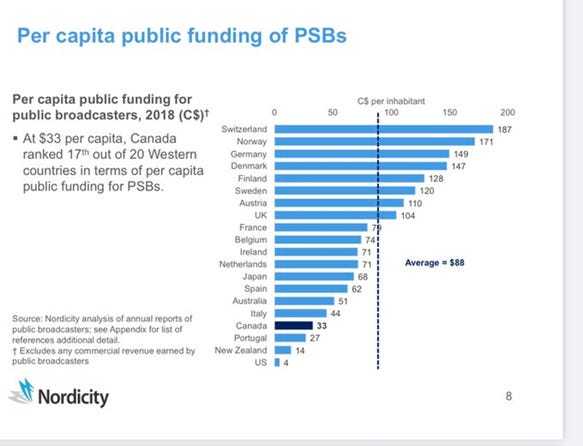
How the CBC is Administered and Funded
The CBC is a Crown corporation owned and funded by the Government of Canada. It is accountable to Parliament through the minister responsible. The minister responsible, with approval of the federal cabinet, appoints the corporation’s board of directors, and the cabinet appoints the CEO and determines the rate of pay. The board and Members of Parliament have some input into the appointment of CEOs and board chairs, but the government makes the ultimate decision. The government can intervene in the management of a Crown corporation by having the minister responsible issue a directive to the board of directors ordering them to take a specific action.[39]
Fixing the CBC
If the resigning journalists are correct, we are not likely to find out how to fix the CBC from the CBC itself.
Mr. Palmer noted above that because CBC Radio does not have advertising, “something else is being done here” between the public media agencies of several countries – hinting that the international quest for a “single strong voice” against misinformation, pursued by the Global Task Force for Public Media under chairperson Catherine Tait, is overshadowing the traditional editorially-independent CBC role “of elevating the voices of Canadians on Canadian stories, to unite our vast country, and make us all feel as one.”
This “something else” — to standardize one-voice media — is what Canadians need to understand before their long-beloved public broadcaster is dismantled by 46% popular demand.
Ms. Henley said that to work at the CBC now “is to become less adversarial to government and corporations and more hostile to ordinary people.”
That it is “to allow sweeping societal changes like lockdowns, vaccine mandates, and school closures to roll out — with little debate.”
Judging by the composition of the 12-member Liberal Cabinet-appointed board of directors – of whom three have truth and reconciliation backgrounds; three have corporate media backgrounds; three have digital technology expertise; and only three have cultural backgrounds – this is not surprising.[40]
CBC’s board of directors does not choose the CBC president. And the board cannot dismiss the president. The prime minister chooses the president. This is not a new development; it goes back to 1936. In contrast, the director-general of the BBC is chosen by the BBC’s trustees, and those trustees can fire their director-general.[41]
It seems clear from the above that the CBC has been captured, not only by identity politics, but by combined government and corporate agendas, almost certainly influenced by the private-public World Economic Forum and its proud young national graduates – the WEF’s “young global leaders” – with Justin Trudeau among them.
Can the CBC still perform as a national unifying force?
The CBC’s legislated role “to contribute to the development of a shared national consciousness and identity” is being destroyed by identity-politics. This is partly a result of the rise of post-modernism in communication theory and journalism schools.
Post-modernism is a late twentieth-century form of subjectivism that makes it impossible to have serious rational discussions and work towards common ground. This trend is partly what is preventing the CBC from performing as a national unifying force.
Some steps that may be taken:
1. CBC policy-makers need to acknowledge that they are failing in their shared-identity mandate and commit to doing better
2. CBC accountability for violating journalistic ethics and standards should be enforced by a new, provincially-elected citizen oversight board
3. Governments have appointed poor CBC leaders over recent years. Leaders need to be chosen with elected citizen oversight according to the priorities of its legislated mandate.
4. Identity politics has taken a divisive turn. Cultural pluralism should be a point of pride for all Canadians, not a cudgel to use against select groups. (This may require a public inquiry in which everyone is heard.)
5. The societal problem of post-modernism should be addressed in serious discussions, working towards common ground for all Canadians.[42]
Conclusion
The online-digital role of CBC’s US-import Catherine Tait will expire in July of 2023. Tait has appointed 6 members of her 7-member executive team and all but one came from the corporate world. (Marco Dubé is the only journalist who rose through the CBC ranks.)[43]
Indeed, Tait has filled the CBC with a new breed of journalists, causing some of the ethically best and brightest to resign. The CBC as we have known it for decades is in a state of collapse.

As columnist Terry Glavin has put it:
In the decades following its inception, the whole point of the CBC was to provide an informative, welcoming, entertaining and unifying place on the airwaves outside the raucous cacophony of the American mass media. It was to be a place where Canadians could get to know one another and to know about their country. And it did a pretty good job of it.
But now, the CBC brass has rebranded the organization along lines that blend seamlessly with the faddish haute-bourgeois obsessions the Trudeau Liberals’ have drawn straight from the culture wars that have so enfeebled the United States.
Rather than provide a place where Canadians can have their own conversations, the CBC’s $436,000-a-year CEO Catherine Tait (and her whiter-than-white board of governors and her seven vice-presidents, ten directors-general, her $900,000-a-year “strategic intelligence department” and her 143 executive directors) joined forces with the Trudeau Liberals in a multi-year funding package to mainline those American toxins straight into the bloodstream of Canadian culture.
What’s new here is a weird sensibility that masquerades as “progressive” that’s a perfect fit with Trudeau’s self-professed determination to remodel Canada as a “post-national” country with “no core identity” and “no mainstream.” It’s a radical experiment born from the luxury of living under the American security umbrella and immense natural-resource wealth and the sacrifices of Canadians whose struggles it has become decidedly unfashionable to even remember.
What unites and binds the Trudeau Liberals with the CBC brass – and for that matter, with the Canadian Radio-Television and Telecommunications Commission, and the Canada Council for the Arts, and so on – is a mutually-reinforcing ideational package. . . please don’t make me say “woke.” What the hell, I said it. You know what I mean.
What I mean is an epistemology that supplants and replaces systems of knowledge and truth-seeking with rigidly-enforced systems of belief and ideology that purport to be “progressive.” It’s a phenomenon that is fatally corrosive to the disciplines we’ve always relied upon, in conversations and arguments among and between people of the “left” and the “right,” to establish broad societal agreement about what constitutes the truth.[44]
In other words, what we have now is a case of post-modern irrationality.
And the polls are suggesting that it’s time for a complete overhaul.
If the CBC if it is to continue as a government-funded entity, a new legislated commitment must be made to the Canadian people.
The board of directors clearly needs to be reviewed.
A citizen oversight board with an elected representative from every province should be established to meet regularly at specified intervals, and to appoint future CBC boards of directors.
CBC funding has stagnated for decades. Its funding should be supplied by a television licence fee (like the BBC) and not be subject to the policy and content influences of advertising.
A proposal outlining the essential steps for a CBC overhaul, and a restoration of its 1985 per capita funding, should be submitted formally to the Canadian people for input – and then to Parliament for approval.
[1] I am grateful to Mr. Palmer for his excellent slides, some of which I have incorporated into this essay, with acknowledgments to him. (https://rumble.com/v2fs7u2-rodney-palmer-full-interview-day-1-toronto-national-citizens-inquiry.html).
[2] “A Citizen-Led Inquiry into Canada’s COVID-19 Response. Canada’s federal and provincial governments’ COVID-19 policies were unprecedented…These interventions into Canadians’ lives, our families, businesses, and communities were, and to great extent remain, significant. In particular, these interventions impacted the physical and mental health, civil liberties and fundamental freedoms, jobs and livelihoods, and overall social and economic well-being of nearly all Canadians.
These circumstances demand a comprehensive, transparent, and objective national inquiry into the appropriateness and efficacy of these interventions, and to determine what lessons can be learned for the future. Such an inquiry cannot be commissioned or conducted impartially by our governments as it is their responses and actions to the COVID-19 which would be under investigation.
The National Citizen’s Inquiry (NCI) is a citizen-led and citizen-funded initiative that is completely independent from government.” (https://nationalcitizensinquiry.ca/).
[3] Jesse Brown, “The President of the CBC Lives In Brooklyn: She’s been back and forth throughout the pandemic,” Canadaland, 11 December 2020 (https://www.canadaland.com/the-president-of-the-cbc-lives-in-brooklyn/).
[4] “Under U.S. election law, it is illegal for someone who is not an American citizen to contribute to a U.S. election campaign.” Elizabeth Thompson, “Hundreds of Canadian residents contributing to U.S. candidates,” CBC News, 7 November 2016 (https://www.cbc.ca/news/politics/canada-trump-clinton-u-s-election-1.3837993).
[5] “Filings with the United States’ Federal Election Commission (FEC) show that CBC CEO Catherine Tait donated to the presidential campaign of Democratic Party candidate Hillary Clinton in 2016….At the height of the Covid-19 pandemic, Tait’s own status as a Canadian citizen was also brought into question after the online outlet Canadaland published an article revealing how the CBC CEO owned a $5.4 million residence in Brooklyn, New York with her husband.
According to CBC, Tait was required to take a second residence in Canada in order to comply with the broadcaster’s requirements.”
Cosmin Dzsurdzsa, “CBC CEO donated to Hillary Clinton, listed NY as residence,” True North, 18 April 2023 (https://tnc.news/2023/04/18/cbc-ceo-clinton-ny-residence1/).
[6] CBC/Radio-Canada, “CBC’s new President: Who is Catherine Tait?” n.d.
[7] https://en.wikipedia.org/wiki/Catherine_Tait
[8] CBC/Radio-Canada, “CBC/Radio-Canada joins global charter to fight disinformation,” 9 September, 2019 (https://cbc.radio-canada.ca/en/media-centre/trusted-news-charter-fight-disinformation).
[9] Ibid.
[10] https://en.wikipedia.org/wiki/Global_Task_Force_for_Public_Media
[11] https://www.publicmediaalliance.org/global-task-force/
[12] “Trusted News Initiative announces plans to tackle harmful coronavirus disinformation,” 27 March 2020 (https://cbc.radio-canada.ca/en/media-centre/trusted-news-initiative-plan-disinformation-coronavirus).
[13] RSF, “RSF and its partners unveil the Journalism Trust Initiative to combat Disinformation,” 3 April 2018 (https://rsf.org/en/rsf-and-its-partners-unveil-journalism-trust-initiative-combat-disinformation).
[14] Prof. Eugene Lang, “CBC president Catherine Tait is out of her lane,” 24 February 2023 (https://policyoptions.irpp.org/magazines/february-2023/cbc-president-catherine-tait-is-out-of-her-lane/).
[15] Lee Harding, “Ex-CBC journalist testifies broadcaster did propaganda, not newsgathering,” 6 April 2023 (https://www.westernstandard.news/news/ex-cbc-journalist-testifies-broadcaster-did-propaganda-not-newsgathering/article_ec81c9dc-d481-11ed-ac8e-93c1d6a543ce.html).
[16] Rodney Palmer FULL Interview | Day 1 Toronto | National Citizens Inquiry, 4 April 2023 (https://rumble.com/v2fs7u2-rodney-palmer-full-interview-day-1-toronto-national-citizens-inquiry.html).
[17] https://www.brown.edu/academics/public-health/about/people/dean/about-jha
[18] Ashish Jha, “The Snake-Oil Salesmen of the Senate,” New York Times, 24 November 2020 (https://www.nytimes.com/2020/11/24/opinion/hydroxychloroquine-covid.html).
[19] https://twitter.com/DrEliDavid/status/1642628294460727296?s=20
[20] Lee Harding, “Ex-CBC journalist testifies broadcaster did propaganda, not newsgathering,” 6 April 2023 (https://www.westernstandard.news/news/ex-cbc-journalist-testifies-broadcaster-did-propaganda-not-newsgathering/article_ec81c9dc-d481-11ed-ac8e-93c1d6a543ce.html).
[21] EBU: Operating Eurovision and Euroradio, “Trusted News Initiative steps up global fight against disinformation and targets US presidential election,” 13 July 2020 (https://www.ebu.ch/news/2020/07/trusted-news-initiative-steps-up-global-fight-against-disinformation-and-targets-us-presidential-election).
[22] Eric Horvitz, “A promising step forward on disinformation, Microsoft, 22 February 2021 (https://blogs.microsoft.com/on-the-issues/2021/02/22/deepfakes-disinformation-c2pa-origin-cai/).
[23] Rodney Palmer, “Propaganda VS Newsgathering at CBC and other media,” The Crazy Times, p. 5, 4 April 2023.
[24] Peter A. McCullough, et al., “Pathophysiological Basis and Rationale for Early Outpatient Treatment of SARS-CoV-2 (COVID-19) Infection,” Am J Med. 2021 Jan; 134(1): 16–22 (https://www.ncbi.nlm.nih.gov/pmc/articles/PMC7410805/).; Published online 2020 Aug 7. doi: 10.1016/j.amjmed.2020.07.003. See also the very extensive website, c19study.com; see https://swprs.org/on-the-treatment-of-covid-19; and see PubMed for further outpatient Covid early treatment, (https://pubmed.ncbi.nlm.nih.gov/?term=%28%22early+outpatient+treatment%3A%29+AND+%28covid-19+OR+sars-2%29&sort=).
[25] https://twitter.com/woodreporting/status/1644121846151798786?s=46&t=TLc7JVsKdWHF3–cJphA0g
[26] https://www.trishwoodpodcast.com/podcast/episode-158-rodney-palmer
[27] Jonathan Bradley, “Israeli doctors scold Trudeau for comparing convoy protesters to Nazis, True North, 19 February 2022 (https://tnc.news/2022/02/19/israeli-doctors-scold-trudeau-for-comparing-convoy-protesters-to-nazis/).
[28] Trish Wood is Critical, “Episode 116: Marianne Klowak,” circa 4 July 2022 (https://www.trishwoodpodcast.com/podcast/episode-116-marianne-klowak).
[29] Melanie Risdon, “CBC reporter resigns, says public broadcaster losing journalistic principles,” Western Standard, 13 July 2022 (https://www.westernstandard.news/manitoba/cbc-reporter-resigns-says-public-broadcaster-losing-journalistic-principles/article_f72ab8a0-022a-11ed-919a-431ab20401f3.html).
[30] Tara Henley, “Why I quite the CBC,” National Post, 3 January 2022 (https://nationalpost.com/opinion/tara-henley-why-i-quit-the-cbc?__vfz=medium%3Dstandalone_content_recirculation_with_ads).
[31] Ibid.
[32] Ibid.
[33] Joanna Chiu and Steve McKinley, “Is CBC at a crossroads? Or are Twitter spat and Poilievre barbs just more of the same?” The Standard, 23 April 2023 (https://www.stcatharinesstandard.ca/ts/news/canada/2023/04/23/is-cbc-at-a-crossroads-or-are-twitter-spat-and-poilievre-barbs-just-more-of-the-same.html).
[34] Ibid.
[35] Laura Neilson Bonikowsky, “Founding of the Canadian Broadcasting Corporation (CBC),” The Canadian Encyclopedia, 4 March 2015 (https://www.thecanadianencyclopedia.ca/en/article/founding-of-the-cbc-feature).
[36] https://en.wikipedia.org/wiki/Canadian_Broadcasting_Corporation
[37] Canadian Broadcasting Corporation, “2020-2021 Annual Report”. Archived from the original on March 22, 2023.
[38] Paul Audley, “The future of CBC/Radio-Canada is at stake in this election: Canada’s national public broadcasting services are in a position of unprecedented vulnerability after decades of cuts under both Conservative and Liberal governments,” Toronto Star, 3 September 2021 (https://www.thestar.com/opinion/contributors/2021/09/03/the-future-of-cbcradio-canada-is-at-stake-in-this-election.html).
[39] Pinned comment at “CBC editorial independence is a lie,” National Post, 13 April 2023 (https://nationalpost.com/opinion/cbc-editorial-independence-is-a-lie).
[40] https://cbc.radio-canada.ca/en/vision/leadership/board-of-directors
[41] https://legacy.friends.ca/explore/article/how-to-fix-the-cbc/
[42] With thanks to Robert Meynell for assistance with these points.
[43] https://cbc.radio-canada.ca/en/vision/leadership/senior-executive-team
[44] Terry Glavin, “Something’s Deeply Wrong With The CBC, therealstory.substack.com, 22 April 2023.
.png)
